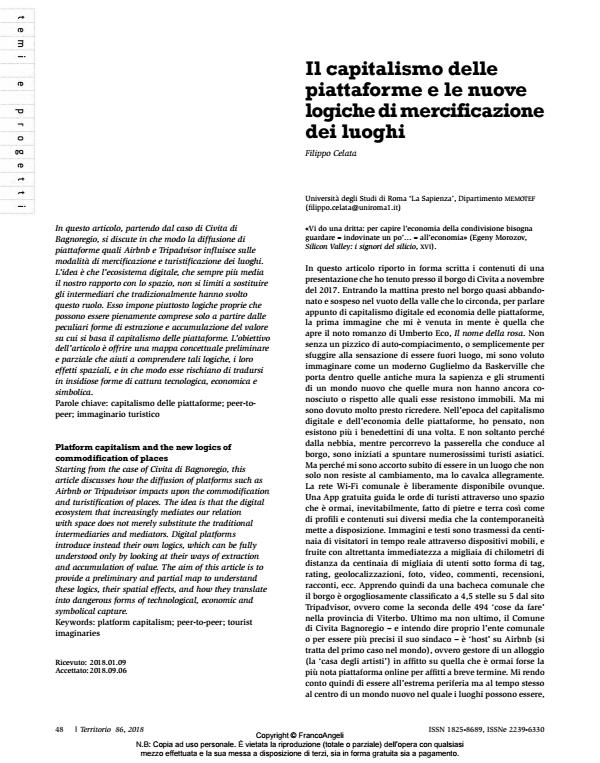Il capitalismo delle piattaforme e le nuove logiche di mercificazione dei luoghi
Titolo Rivista TERRITORIO
Autori/Curatori Filippo Celata
Anno di pubblicazione 2019 Fascicolo 2018/86
Lingua Italiano Numero pagine 9 P. 48-56 Dimensione file 485 KB
DOI 10.3280/TR2018-086006
Il DOI è il codice a barre della proprietà intellettuale: per saperne di più
clicca qui
Qui sotto puoi vedere in anteprima la prima pagina di questo articolo.
Se questo articolo ti interessa, lo puoi acquistare (e scaricare in formato pdf) seguendo le facili indicazioni per acquistare il download credit. Acquista Download Credits per scaricare questo Articolo in formato PDF

FrancoAngeli è membro della Publishers International Linking Association, Inc (PILA)associazione indipendente e non profit per facilitare (attraverso i servizi tecnologici implementati da CrossRef.org) l’accesso degli studiosi ai contenuti digitali nelle pubblicazioni professionali e scientifiche
In questo articolo, partendo dal caso di Civita di Bagnoregio, si discute in che modo la diffusione di piattaforme quali Airbnb e Tripadvisor influisce sulle modalità di mercificazione e turistificazione dei luoghi. L’idea è che l’ecosistema digitale, che sempre più media il nostro rapporto con lo spazio, non si limiti a sostituire gli intermediari che tradizionalmente hanno svolto questo ruolo. Esso impone piuttosto logiche proprie che possono essere pienamente comprese solo a partire dalle peculiari forme di estrazione e accumulazione del valore su cui si basa il capitalismo delle piattaforme. L’obiettivo dell’articolo è offrire una mappa concettuale preliminare e parziale che aiuti a comprendere tali logiche, i loro effetti spaziali, e in che modo esse rischiano di tradursi in insidiose forme di cattura tecnologica, economica e simbolica.
Parole chiave:Capitalismo delle piattaforme; peer-topeer; immaginario turistico
- From the City as a Project to the City Project Caterina Valiante, Rossella Moscarelli, pp.323 (ISBN:978-3-031-94234-1)
- La geografia delle piattaforme digitali Antonello Romano, pp.8 (ISBN:978-88-5518-602-5)
- Pandemia e (im)mobilità: gli effetti spaziali del lockdown attraverso i Big Data delle piattaforme d FrancoAngeli Journals, in RIVISTA GEOGRAFICA ITALIANA 4/2021 pp.5
DOI: 10.3280/rgioa4-2021oa12956
Filippo Celata, Il capitalismo delle piattaforme e le nuove logiche di mercificazione dei luoghi in "TERRITORIO" 86/2018, pp 48-56, DOI: 10.3280/TR2018-086006